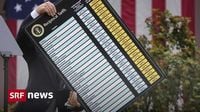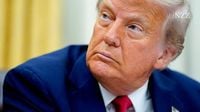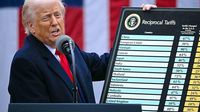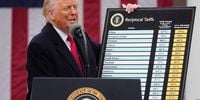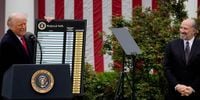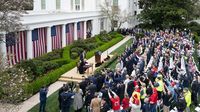On April 2, 2025, U.S. President Donald Trump announced a sweeping new tariff regime during a speech in Washington, D.C., marking a significant escalation in his administration's trade policies. Dubbed the "Liberation Day" for the U.S. economy, the new tariffs will impose a 31 percent surcharge on imports from Switzerland, a 20 percent surcharge on goods from the European Union, and a staggering 34 percent on imports from China. Trump characterized these tariffs as a necessary response to what he described as unfair trading practices that have exploited the U.S. economy for decades.
In his address, Trump accused close trading partners of having "plundered and raped" the United States through their tariff policies, claiming that the new measures would help restore American manufacturing and create jobs. He stated that a minimum tariff rate of ten percent would be applied to imports from all other countries, indicating a shift towards a more protectionist trade strategy.
The announcement follows a controversial incident where a 29-year-old man from Maryland was mistakenly deported to El Salvador. This administrative error has sparked outrage among civil rights advocates, who argue that the Trump administration's immigration policies have been excessively harsh and poorly executed. The man, Kilmar A. G., was arrested on March 12, 2025, and taken to a terrorism confinement center, with his family now pleading for his return.
Trump's new tariffs are part of a broader strategy to impose reciprocal tariffs on countries that maintain higher tariffs on U.S. products. For instance, he highlighted that the U.S. would charge about half the tariffs that other nations impose on American goods. This approach is intended to level the playing field and encourage domestic production.
However, analysts warn that these new tariffs could lead to increased inflation and stagnation in the U.S. economy, as importers are likely to pass on the higher costs to consumers. The implications of this policy shift are particularly concerning for the Swiss export economy, which is now facing significant challenges due to the new 31 percent tariff.
Swiss President Karin Keller-Sutter responded to the tariff announcement, stating that the Federal Council acknowledges the U.S. decisions and will quickly determine the best course of action. She emphasized that the long-term economic interests of Switzerland must take precedence, while also reaffirming the country's commitment to international law and free trade.
Economiesuisse, the Swiss business association, expressed alarm over the tariffs, arguing that they represent a serious burden on the Swiss export industry. The association noted that the U.S. is the most important export market for Switzerland, surpassing even Germany, and called for immediate negotiations to mitigate the impact of the tariffs.
In a related development, Trump’s tariffs have also drawn sharp criticism from international leaders. Ursula von der Leyen, President of the European Commission, labeled the tariffs a "severe blow to the global economy" and warned that the EU is prepared to respond with countermeasures to protect its interests.
Japan, which will face tariffs of 24 percent on its goods, has also expressed concern, with government officials describing the U.S. measures as "extremely regrettable" and urging a reconsideration of the policy. The situation has escalated tensions between the U.S. and its allies, as many countries fear that they may be caught in the crossfire of a renewed trade war.
China's response was swift, with the government threatening countermeasures against the U.S. tariffs. The Chinese Ministry of Commerce criticized the U.S. for its "unilateral and subjective" approach, asserting that such actions undermine international trade rules and harm the rights and interests of affected parties.
As the global trade landscape shifts, Trump's administration is facing mounting pressure to justify its aggressive tariff policies. The announcement of these new tariffs has not only raised concerns among U.S. consumers about potential price increases but also highlighted the complex web of international trade relations that could be jeopardized by these decisions.
Trade experts suggest that the U.S. could see retaliatory actions from affected countries, which may further complicate the economic landscape. The potential for a trade war looms large, with many fearing that the escalating tensions could lead to a downward spiral in global trade.
In conclusion, Trump's latest tariff announcements represent a significant departure from previous trade policies and signal a new era of economic nationalism. While the administration touts these measures as a means to protect American workers and industries, the long-term consequences for both the U.S. and global economies remain uncertain. As countries respond to these tariffs, the world watches closely to see how the situation unfolds and what it means for international trade.
